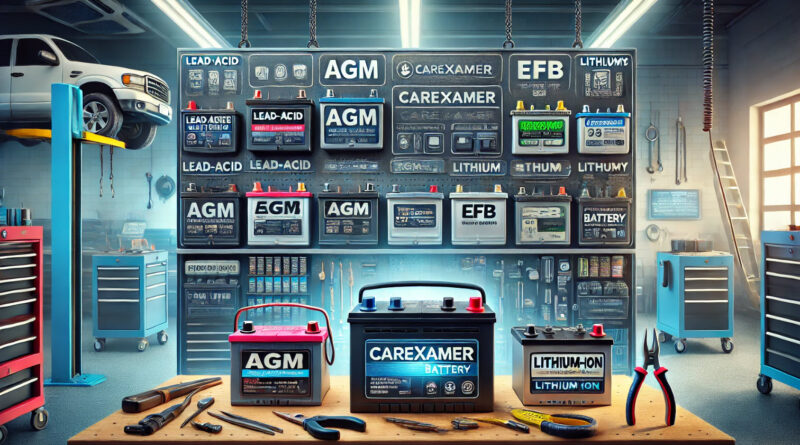Guide To Types of Car Batteries and What They Mean
This article will explore the different types of car batteries, their advantages, and what they mean for you as a car owner. Choosing the right car battery is crucial for ensuring your vehicle runs smoothly and efficiently. With various types of car batteries available, understanding their differences can help you make an informed decision when it’s time for a replacement.
1. Lead-Acid Batteries
Overview:
Lead-acid batteries are the most common type of car battery. They have been in use for over a century and are known for their reliability and affordability. These batteries are typically used in traditional combustion engine vehicles.
Types of Lead-Acid Batteries:
- Flooded (Wet Cell) Batteries: These are the most basic form of lead-acid batteries. They require regular maintenance, such as checking and topping up the electrolyte levels with distilled water. Flooded batteries are known for their longevity and are widely used in many vehicles.
- Sealed Lead-Acid (SLA) Batteries: Also known as maintenance-free batteries, SLAs are sealed and don’t require regular topping up of electrolytes. They are less prone to leakage and are commonly found in newer vehicles.
Advantages:
- Affordable
- Reliable performance
- Easy to find and replace
Considerations:
- Flooded batteries require regular maintenance.
- Lead-acid batteries are heavier than other types.
- They have a shorter lifespan compared to newer technologies.
2. AGM (Absorbent Glass Mat) Batteries
Overview:
AGM batteries are an advanced version of lead-acid batteries. They use a fiberglass mat to absorb the electrolyte, which makes them spill-proof and more resistant to vibration. AGM batteries are commonly used in modern vehicles with start-stop systems, as well as in high-performance cars.
Advantages:
- Maintenance-free
- Longer lifespan compared to traditional lead-acid batteries
- Faster recharging times
- Better performance in extreme temperatures
- Suitable for vehicles with high electrical demands
Considerations:
- More expensive than standard lead-acid batteries
- Can be sensitive to overcharging
3. EFB (Enhanced Flooded Battery)
Overview:
EFB batteries are a step up from standard flooded batteries and are designed for vehicles with start-stop systems. They offer improved durability and performance compared to traditional lead-acid batteries.
Advantages:
- Improved charge acceptance
- Greater cycling durability
- Suitable for vehicles with start-stop technology
Considerations:
- More expensive than standard lead-acid batteries
- Shorter lifespan compared to AGM batteries
4. Lithium-Ion Batteries
Overview:
Lithium-ion batteries are the latest innovation in automotive battery technology. They are lightweight, have a high energy density, and are commonly used in electric vehicles (EVs) and hybrid cars. Some high-performance sports cars also use lithium-ion batteries due to their superior power-to-weight ratio.
Advantages:
- Lightweight
- Longer lifespan
- Fast charging capabilities
- Higher energy density
Considerations:
- Expensive compared to other types of batteries
- Sensitive to high temperatures
- Not commonly used in traditional internal combustion engine vehicles
5. Gel Cell Batteries
Overview:
Gel cell batteries are a type of sealed lead-acid battery that uses a gelified electrolyte. They are known for their deep cycling capabilities and are often used in off-road vehicles, motorcycles, and boats.
Advantages:
- Maintenance-free
- Spill-proof and leak-proof
- Good for deep cycling applications
- Performs well in extreme temperatures
Considerations:
- More expensive than flooded lead-acid batteries
- Not ideal for high-cranking applications in cold weather
Which Battery is Right for You?
Choosing the right car battery depends on your vehicle’s requirements, your driving habits, and your budget. Here’s a quick guide to help you decide:
- For traditional vehicles: A standard lead-acid or EFB battery is usually sufficient, especially if you’re looking for an affordable option.
- For modern vehicles with start-stop systems: Consider investing in an AGM or EFB battery to meet the higher demands of your vehicle’s electrical system.
- For electric or hybrid vehicles: Lithium-ion batteries are the standard, offering the best performance and efficiency.
- For high-performance or off-road vehicles: AGM or gel cell batteries provide the durability and power needed for demanding applications.
Understanding the different types of car batteries and their benefits is essential for making an informed decision when it’s time to replace your battery. Whether you need a basic lead-acid battery or a high-performance lithium-ion battery, choosing the right one can enhance your vehicle’s performance, reliability, and lifespan. Always consider your vehicle’s specific needs and consult with a professional if you’re unsure which battery type is best for you.
Buying a used VW. Buying used vauxhall, BMW, Jaguar, Ford, Volvo, Range rover, Bentley, Aston Martin, Porsche, Ferrari, Lamborghini, Maserati, Hyundai, Tesla, Honda, Pagani

